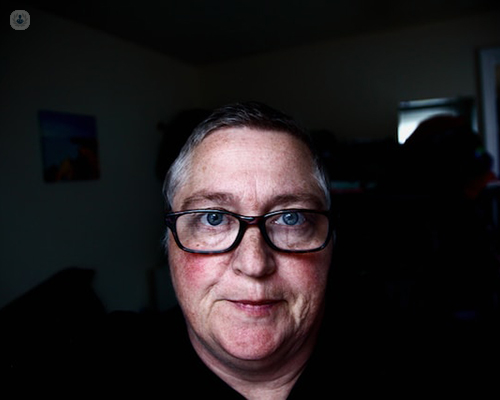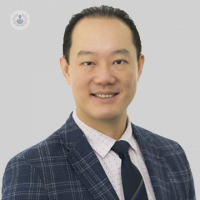Rosacea: triggers, management and treatment
Written by:What is rosacea and why does it occur?
Rosacea is a skin condition where the patient mainly presents with a red face. It tends to occur when there is a change in temperature, when consuming alcoholic drinks or if patients are exposed to the sun.
It often affects patients who are between 30 and 50 years old. Sometimes rosacea can present with pustules on the skin which may make the condition more like acne.

What are the most common triggers?
One of the most common triggers is stress; when things are stressful, you get a flush of redness in your face. Sun exposure is another common trigger. If you are out in the sun, you get redness when you come inside, from sunburn.
If you traumatise your skin in any way and you rub it, this will create inflammation on the skin.
Additionally, alcoholic drinks and stimulant drinks like caffeine will aggravate rosacea.
Can rosacea and acne appear together?
Rosacea and acne are two different diseases and each group affected by them tend to be different.
Acne mainly develops in patients who are in their early teens to late twenties while rosacea tends to affect patients betweeen 30 and 50 years old.
However, they can overlap. You can get rosacea from a young age and acne can develop in older patients. They occassionally occur together.
As a result, it is important to differentiate the two; whether you have one or the other or both at the same time. This is because rosacea with pustules can sometimes look like acne and may be treated as acne, which may not be benefical.
How is rosacea managed? What type of treatments are available?
There are four types of rosacea. One type is when the face is just red. There is a redness in the central part of the face, sometimes redness on the neck and chest and even the ears. However, redness on the ears occurs very rarely.
The second type is the acne type which is the pustules on the skin.
The third type is when it affects the nose of the patient. It makes the nose look bigger.
The fourth type is rosacea which affects the eyes, when the eyes feel very gritty.
Treatment depends on the type of rosacea you have. If you have the acne type rosacea with pustules you may be given antibiotic tablets. Antibiotic creams and gels can also be used to control that type of rosacea.
If you have rosacea which is just red in colour then it can be treated with laser or Tixel. Another type of treatment is Intense Pulsed Light (IPL) treatment. It uses light energy to treat the redness of the skin.
If you’ve got the nose type of rosacea then it will require surgery. Laser surgery is one treatment available to treat rosacea which affects the nose. Treatment for rosacea of the nose will require removing excess tissue to reshape the nose again.
The fourth type of rosacea is the one that affects the eyes. If you are affected by rosacea of the eyes, you will need to treat an eye specialist.
What else can patients do to control their rosacea?
There are multiple ways that people can control their rosacea.
The first thing they should do is avoid the triggering factors. The main trigger is alcohol, which is not just in drinks but also in perfume
There are a lot of alcohol based perfumes because the perfume cannot be diluted in wtaer and has to be diluted in alcohol. Patients with rosacea must avoid this type of perfume.
It is important to avoid products which contain alcohol such as soaps and alcoholic drinks themselves. Patients should cut down on consumption of alcoholic drinks because they can reduce flushing in the face.
Certain foods can trigger rosacea, in particular spicy food. Chilli based spicy food is very triggering for rosacea, as well as food which is too hot. Stimulants such as caffeine, must also be reduced.
The skin of rosacea patients is already inflammed, therefore it is important that they are gentle with the skin. When they wash their face, they must not rub the skin with towels or use scrubs on the face because the trauma to the skin will create more inflammation. It is important pat dry rather than rub dry.
Rosacea due to sun exposure can worsen rosacea, therefore it is recommended that patients with rosacea cut down on sun exposure. If exposed to the sun, they should use SPF, ideally factor 30 or 50.
If all these things still cause redness and the patient is very self conscious then they can cover the skin with make up to reduce redness.
Does rosacea worsen with age?
Rosacea occassionally occurs in patients over the age of 50 and occassionally it can get worse, however, the majority of people do not get worsening of rosacea over the age of 50.


